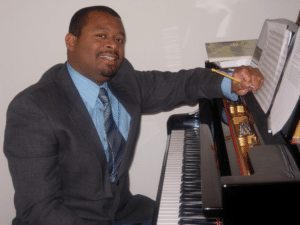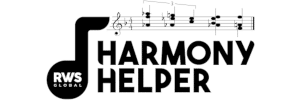Meet James Lee III, called a “gifted young composer” (Cincinnati Enquirer) whose “bright, pure music” (Washington Post) is “tonal but highly complex” (South Florida Classical Review) and “vibrant [and] richly layered” (Baltimore Sun). James Lee III composes in every medium ranging from orchestral and band works to chamber ensemble, sacred choral and vocal pieces, and works for solo piano. Dr. Lee’s works have premiered and been performed domestically and internationally in Brazil, Argentina, Russia, and Cuba.

How has Covid-19 impacted your work?
Covid-19 has impacted my work only in the sense that all the concerts for 2020 had been cancelled as a result of the pandemic as is the case with so many other composers and performers.
Have you been able to collaborate with other composers/artists during the lockdown?
I have been able to collaborate with other composers during the lockdown mostly by presenting my music at composition seminars via Zoom. I was a guest of composer Dr. Joel Puckett for his orchestration class at the Peabody Seminar in April 2020. In November 2020, I was a guest of Dr. Alexis Bacon for her composition seminar at Michigan State University.
What technology have you used to continue to do your work in a virtual world? Have you used any music or singing apps?
My work with technology has been the same as before the pandemic. I use the Sibelius music notation software to input my musical compositions.
You compose in every medium ranging from orchestral and band works, to chamber ensemble, sacred choral and vocal pieces, and works for solo piano. Is there a favorite medium and how do you move from one to the next?
My favorite medium to compose for, by far, is writing for the orchestra. Most of the time, I am composing for an orchestral commission that I received, but when I do switch to a different medium, I try to think about what I’m most interested in communicating through the chosen medium. I also think about what would be idiomatic for the new piece and how can I expand the emotional and dramatic spectrum of the work.
Can you tell us a little about your process of composing?
First, as a Christian, I pray to God for help and inspiration before I start to compose. Then I will think about my objectives for the new composition. I often write a type of graph to outline special events that I’d like to have appear at certain moments in time throughout the piece. I then think about layering and textual counterpoint. I have found that I like to derive melodies from the harmonic language that I am employing.
October 2006 was a defining moment in your career when the National Symphony gave the world premiere of your orchestral work Beyond Rivers of Vision at the Kennedy Center in Washington, DC. Can you tell us about this experience?
October 2006 was a wonderful moment. It all started in either late January or early February 2005 when I attended a National Symphony Orchestra concert and I thought about how wonderful it would be if I could have the orchestra perform my orchestral dissertation from the University of Michigan. I sent a message to my professor William Bolcom, who was a friend of Leonard Slatkin and I asked him to put me in contact with Maestro Slatkin. I ended [up] meeting with Slatkin in February 2006 and he ended up programming the work for a premiere in October 2006. The rehearsal experience was wonderful and I was able to learn more about orchestration from this experience. This experience also led to more opportunities to have my orchestral music programmed.
Of the hundreds of pieces you have created, is there one that you are most proud of? As a composer, you get to see many of your works in performance. Has there been a moment in your career that surprised or inspired you while watching one of your works being performed?
There are various works that I think that I can be proud of. I think in terms of orchestral music, Sukkot Through Orion’s Nebula and Amer’ican make me the proudest. I think that from my chamber music output, my Piano Trio No. 2 “Temple Visions” and my Sonata No. 2 for Violin and Piano make me the proudest. I was really inspired to continue to pursue my desire to be a composer and obtain commissions and performances of my works after I heard the Detroit Symphony Orchestra premiere my A Different Soldier’s Tale in 2008 with Leonard Slatkin as the conductor. That was the first orchestral work that I composed after I graduated with my D.M.A. from the University of Michigan in 2005.
Has it been difficult as a black man to excel in an industry with little diversity? How has your heritage impacted your work?
I don’t know if I can say that being a black man has made it very difficult to excel and receive opportunities. I have been blessed to have my music heard by a professional orchestra only one year after my graduation. Since then, I have been able to have many great experiences. It is a known fact that many black Americans have American Indian in their family and I have also explored these ideas in various works of mine. Since I was a little boy, I have heard and seen family members from Missouri and Alabama that are descendants of American Indians or Aboriginal Indians.
Your artist statement “I want to compose music to reach to the inner soul of the listener that elevates them regardless of race and religious affiliation,” seems more important today than ever. Can you talk about this?
Since music is an international language, I want my music to be communicated to the listener in such a way that they are deeply moved and enriched because of what they had just heard.
James Lee III, called a “gifted young composer” (Cincinnati Enquirer) whose “bright, pure music” (Washington Post) is “tonal but highly complex” (South Florida Classical Review) and “vibrant [and] richly layered” (Baltimore Sun), James Lee III composes in every medium ranging from orchestral and band works, to chamber ensemble, sacred choral and vocal pieces, and works for solo piano. Born in St. Joseph, Michigan, Lee is a “son” of the Great Lakes State having received an undergraduate degree in piano performance, and both his masters and doctorate degrees in composition all from the University of Michigan. His primary composition teachers included William Bolcom, Bright Sheng, and Michael Daugherty.
In 2006 he premiered Beyond Rivers of Vision in Washington D.C. at the Kennedy Center with the National Symphony Orchestra. During his inaugural concerts as the new music director of the Detroit Symphony Orchestra, Mr. Slatkin premiered A Different Soldier’s Tale with the orchestra in Detroit on December 11 – 14, 2008. The National Symphony, Baltimore Symphony, Soulful Symphony, Philadelphia Orchestra, Detroit Symphony, Memphis Symphony, Indianapolis Symphony, and the Southwest Michigan Symphony Orchestra have performed James Lee III’s works. Leonard Slatkin and the Detroit Symphony Orchestra performed Beyond Rivers of Vision on January 29 – 30, 2010.
In May 2010, the Baltimore Symphony Orchestra performed a movement from Beyond Rivers of Vision. James Lee III was also commissioned by the Baltimore Symphony Orchestra to compose a work about the life of Harriet Tubman. The work is called Chuphshah! Harriet’s Drive to Canaan and it was premiered on September 23-25, 2011. He was also named the winner of the Sphinx Commissioning Consortium for the 2011-2012 season. Mr. Lee composed a new work called Sukkot Through Orion’s Nebula that was premiered by Michael Tilson Thomas and the New World Symphony Orchestra on October 15-16, 2011 in Miami Beach, FL.
On January 13, 2013 Gye Nyame for chamber orchestra was premiered by Janise White and the Afro-American Chamber Music Society Orchestra in Los Angeles, CA. Also during the 2012-2013 season Sukkot Through Orion’s Nebula was performed by the Akron Symphony Orchestra in November 2012. The Detroit Symphony Orchestra also played this same work in March 2013. Later in the month of March, Mr. Lee’s newest work for band, Ancient Words, Current Realities! was premiered by the St. Olaf Band at the College Band Directors National Association Conference in Greensboro, NC.
Since Dr. Lee’s graduation with a D.M.A. in composition from the University of Michigan in 2005, his orchestral works have been commissioned and premiered by the National Symphony Orchestra, Detroit Symphony Orchestra, Baltimore Symphony Orchestra, New World Symphony Orchestra, and the orchestras of Philadelphia, Indianapolis, Omaha, Pasadena, Memphis, Grand Rapids, Cincinnati, Atlanta, Akron, and have been conducted by such artists as Leonard Slatkin, Marin Alsop, Michael Tilson Thomas, Juanjo Mena, David Lockington, Thomas Wilkins, and others. During the 2019-2020 season, Sukkot Through Orion’s Nebula is scheduled to be performed by the Louisiana Philharmonic, Boston Symphony Orchestra, Cincinnati Symphony Orchestra, and Chicago Symphony Orchestra. The Detroit Symphony Orchestra has also commissioned James Lee III to compose Amer’ican, which will be premiered in April 2020. James Lee III’s Concert for Piano and Symphonic Band was premiered by Dr. Rochelle Sennet and the Morgan State University Symphonic Band in April 2016 . His Concerto for Clarinet and Symphonic Band was premiered in Córdoba, Argentina by Nicolás Panatteri and the Symphonic Band of the Province of Córdoba in September 2016.
Dr. Lee is also a winner of a Charles Ives Scholarship and the Wladimir Lakond Award from the American Academy of Arts and Letters. Chamber organizations such as the Montrose Trio, Ritz Chamber Players, and the Harlem Chamber Players have performed and premiered music by James Lee III. Pianist Dr. Rochelle Sennet recorded his piano music on the Albany Label in 2014. Dr. Sennet and her husband Igor Kalnin premiered his second violin sonata on March 16, 2019 at Luther College in Decorah, IA. Dr. Lee’s works have been premiered and performed internationally in Brazil, Argentina, Russia, and Cuba. Soprano Alison Buchanan also premiered a new song cycle composed especially for her in Jacksonville, FL and London, England in January and February 2019. In May 2019, Dr. Lee will see the premiere of his Sinfonia de Esperanza in Lima, Peru as part of the University of the Peruvian Adventist Union’s centennial celebrations. During the 2019-20 season the Louisiana Philharmonic Orchestra, Boston Symphony Orchestra, Cincinnati Symphony Orchestra, and Chicago Symphony Orchestra performed Dr. Lee’s Sukkot Through Orion’s Nebula in September, October, and November. During the 2021-2022 or 2022-2023 season, the Detroit Symphony Orchestra will premiere his newly commissioned work Amer’ican that was cancelled due to the COVID-19 pandemic. As concerts are able to resume, other upcoming premieres of Dr. Lee’s work include his Violin Concerto No. 2 “Teshuah” to be premiered by violinist Carla Trynchuk and the Andrews University Symphony Orchestra, Concerto for Piano and Orchestra to be premiered by Daniel Lau and the New England Youth Ensemble, “Wakayoha” Concerto for Bayan, Percussion, and Strings to be premiered by Franko Bozac and the Oregon Music Festival Orchestra. Many other works for orchestra, narrator and orchestra, symphonic band, and chamber music will also be premiered during the upcoming seasons. James Lee III is a Professor of Music at Morgan State University in Baltimore, MD.
